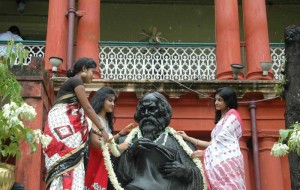
Belgium’s most prestigious and largest university in the city of Leuven, 26 km from Brussels, has honoured India’s world renowned poet, artist and humanist Rabindranath Tagore by erecting his statue in the university premises.
The Indian Council for Cultural Relations (ICCR) presented a sculpture of Tagore to the City of Leuven and India House Leuven. It was erected in the Literary Garden of the Faculty of Arts in the Catholic University of Leuven in an inaugural ceremony to mark Tagore’s birthday on Thursday evening.
Luk Draye, dean of the Faculty of Arts, in his welcome speech described Tagore (1861-1941) “as a freedom fighter and bridge builder between cultures and peoples. And one of India’s most exquisite and versatile artists”.
“We are standing here at a place where Tagore would have felt at home,” he said.
Mohamed Ridouani, alderman of the City of Leuven, said “this bust of Tagore is a symbol in many ways. It is a symbol of friendship between the Leuven community and India”.
He noted that India House Leuven was established in 2012 to make the friendship with India and Leuven even stronger. He pointed out that there are about 800 students from India, Bangladesh and Nepal studying at the Leuven university, particularly in the faculties of engineering and theology.
“Tagore has provided us with his genius an encyclopaedic literature and artistic inspiration and we thank him for that,” Ridouani said.
Bangladesh Ambassador to Belgium, Ismat Jahan, in her speech said that Rabindranath Tagore “would surely have felt very much at home here”.
She paid tribute to “Thakur Tagore as a versatile genius“ noting that Tagore was the first non-European to have won a Nobel Prize for literature in 1913.
“He was an exponent of the Bengal renaissance and an advocate of liberation from the shackles of colonial rule,” said Jahan.
She stated that 250 million Bengali speakers in the Indian state of West Bengal and Bangladesh revere him as Thakur and added that “many do not know that he was an ecologist and an environmentalist”.
Indian Ambassador to Belgium Manjeev Singh Puri lauded Tagore as a “great humanist, a great universalist and great artist”.
“You are honouring by giving a permanent place in your midst to our region’s greatest cultural icon of our times,” he said.
He pointed out that Tagore composed the national anthems of India and Bangladesh and inspired the one of Sri Lanka.
Puri said that William Butler Yeats introduced to the West, Tagore’s famous work “Gitanjali”, or “Song Offering”, in 1911.
The Indian envoy praised Ankan Banerjee, counsellor at the Indian embassy, for his efforts that led to the honouring of Tagore by Leuven.
Earlier, Tapati Mukherjee, director of culture at Vishwa Bharati University in Santiniketan, introduced in an academic session the figure and work of Rabindranath Tagore.
Indian students and Belgian Tagore fans recited from Tagore’s poetry and well known Belgian expert on Bengali language and literature, Philippe Falisse, sang Rabindra sangeet.
The event ended with Movie Night which showed “The Story of Gitanjali”, a short documentary about Gitanjali, Tagore’s Nobel Prize-winning collection of poems, “Charulata” (The Lonely Wife), a 1964 movie based on Tagore’s novella, Nastanirh (The Broken Nest), directed by Satyajit Ray, one of 20th century’s greatest filmmakers.
Both movies were introduced by Abhishek Dutta of Leuven university.